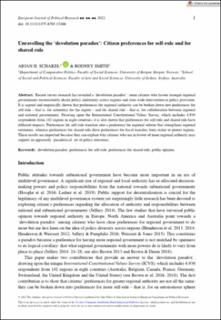Unravelling the ‘devolution paradox’: Citizen preferences for self-rule and for shared rule
Journal article, Peer reviewed
Published version

Åpne
Permanent lenke
https://hdl.handle.net/11250/2977617Utgivelsesdato
2021Metadata
Vis full innførselSamlinger
Sammendrag
Recent survey research has revealed a ‘devolution paradox’: some citizens who favour stronger regional governments inconsistently desire policy uniformity across regions and state-wide intervention in policy provision. It is argued and empirically shown that preferences for regional authority can be broken down into preferences for self-rule – that is, for autonomy for the region – and for shared rule – that is, for collaboration between regional and national governments. Drawing upon the International Constitutional Values Survey, which includes 4,930 respondents from 142 regions in eight countries, it is also shown that preferences for self-rule and shared rule have different impacts. Preferences for self-rule translate into a preference for regional reform that strengthens regional autonomy, whereas preferences for shared rule drive preferences for fiscal transfers from richer to poorer regions. These results are important because they can explain why citizens who are in favour of more regional authority may support an apparently ‘paradoxical’ set of policy outcomes.
